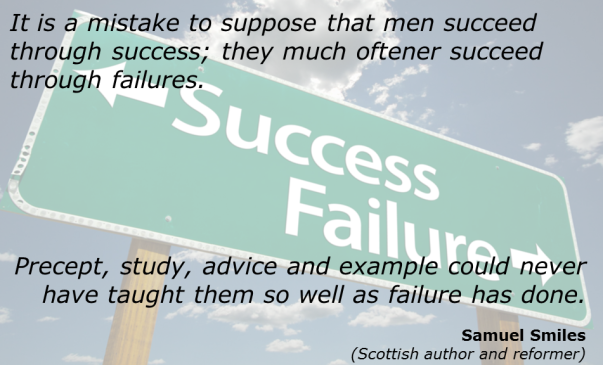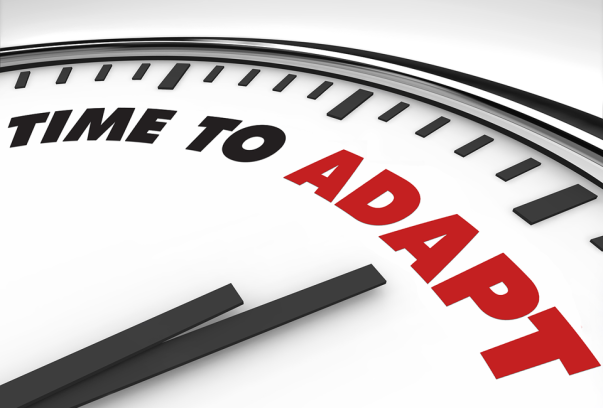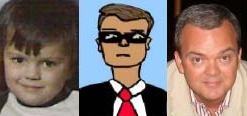A few days ago, I did a post entitled – How have you FAILED today? (and, who might “find out” about it…) – and highlighted two recent books that are actively attempting to fight the myth that …failure is NOT an option.
Both Tim Hartford and Paul Schoemaker have been working very hard to help us see that mistakes or failures should be viewed as “portals of discovery” – and that it is the reflection on and analysis of failure that creates success.
Schoemaker takes this even further and advises organisations and institutions to build “ecosystems” that actually promote failure, allow mistakes to actively add value to people within those organisations – and, even develop a “portfolio of mistakes”.
As I noted, a lot of educational institutions would have trouble adopting this “model” – many indivduals in our schools, colleges and universities still lack the type of reflective and forensic mind-set to step that far out-of-the-box!
- Why is this?
- Why is it that we are so scared of “failure” – or worse “being seen to fail by others”?
Hartford, in his great book “Adapt”, poses a similar question. He asks:
- What are the obstacles to “learning from our mistakes”?
…and, comes up with three very sensible reasons:
- Denial – because we cannot separate our error from sense of self-worth
- Self-destructive Behavior – because we compound our losses by trying to compensate for them
- The “Rose-tinted” Approach to Reflection – whereby we remember past mistakes as though they were triumps, or mash together our failures with our successes.
Most of us will recognise these “habits” as being pretty common – we are humans, after all, and many of us are never fully comfortable with “self-doubt”. We often fail to see the difference between the phrases “I screwed up” and “I am a total screw-up” – and while we do not like to admit that a lot of us have the potential for a wee bit of self-destruction from time-to-time, we do love our off-red sunglasses!
However, as I pondered Hartford’s explanations, I kept coming back to this notion of “habits” – and “culture”. It seems to me that one of the most important obstacles is our preference for a “culture of blame” and (still) an obsession with the “win-lose” mentality.
How often have you heard the questions:
- Whose fault was it?
- Who’s to blame?
- What bloody idiot screwed up this time?
Rather than the far more constructive questions:
- What’s the big picture here?
- Who’s the best person to help us out with this?
- What options do we have? How do we fix it?
Or, even:
- Mmmmm, what can we LEARN from this?
It’s almost as if “finger pointing” and “playing the blame game” is hardwired into our DNA!
We forget that:
…especially, in a organisational or institutional context. This approach is just plain dumb!
Schoemaker helps us see this when he defines a mistake or failure as:
…a decision, an action or a jugdment that is less than optimal, given what was possible to know at the time (p.13)
Why do we rush to assign blame for something that most of us could not have known ahead of time, for the future consequences of past decisions made with imperfect knowledge?
And, how the hell does pointing fingers help indivduals make better decisions or take better decisions in the future – when they are living in constant fear of being “caught out”?
Talk about God complexes! Perhaps, we should all remember – let she that has never screwed up…
Schoemaker’s notion of “a brilliant mistake” may be a bit of an oxymoron – but people who actively promote and maintain our institutional cultures of blame are simply mega-morons!
As I mentioned habits earlier, we might be able to call on someone that can help us with all this. In his latest book, The 3rd Alternative: Solving Life’s Most Difficult Problems, Covey tells us:
Although his book is essentially a refreshing new take on conflict resolution, he suggests a very simple way of overcoming many of the obstacles we face when dealing with failure and mistakes in a finger-pointing culture.
His Third Alternative is amazingly simple to grasp – but needs people to “see” the flaws of our more traditional “alternatives”:
- the First Alternative is “my way”
- the Second Alternative is “your way”
These two approaches to problem-solving are based on the same win-lose mentality that feeds our cultures of blame.
When a mistake is made, someone has to pay and lose, – and it better not be me!
Covey’s Third Alternative – “Our Way” – takes us beyond “my way” or “your way” to a higher and better way. A way that does not involve anyone having to give something up – a “LEARNing way” where everyone “wins”.
Obviously, Uncle Stephen is interested in helping his readers co-create new and better results and build stronger relationships. However, it is his attention to a “win-win” approach to dealing with failures and mistakes that interests me most.
Darwin once said:
It is not so much our “fear of failure” that leads to such motherhood statements as “failure is NOT an option” – it is the mindscapes we have created and allowed to “evolve” and flourish in our schools, colleges and universities. We have been playing the same game for years (some less than others, granted) – but, it has not helped us one bit…
Time to stop! After all…









